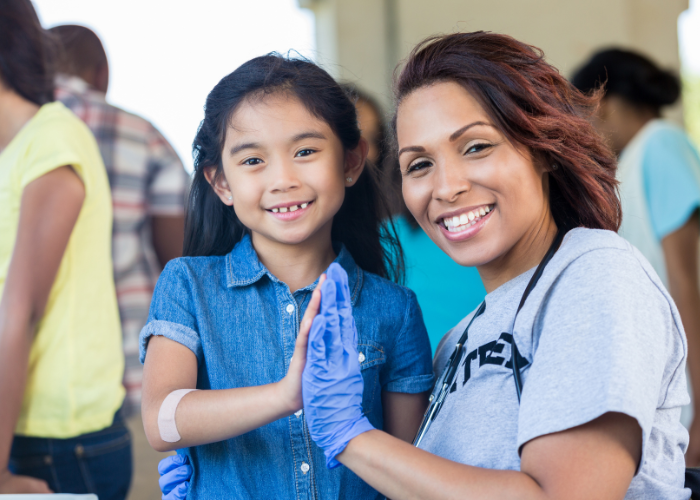IMANA NEWS
Beyond Borders: Volunteering as a Doctor With IMANA
20 May 2024

As a doctor, you have a unique calling to heal the sick and save lives. This is a heavy responsibility, especially given the fact that there is a global shortage of 4.3 million physicians, nurses, and other healthcare professionals.
While it’s a lucrative profession, many areas around the world (particularly poverty-stricken and war-torn countries) are desperately in need of your services.
As a nonprofit organization that advocates equitable healthcare access, the Islamic Medical Association of America (IMANA) invites volunteer doctors to join our medical relief missions in some of the most underserved and underrepresented areas of the globe.
Our volunteers are unpaid, but they gain intangible lifelong benefits.
Why Volunteer Abroad as a Physician
Volunteering as a doctor abroad helps you offer a better life to those living in low- and middle-income countries, including people displaced by conflict. But you also enjoy several rewarding benefits:
Cultivates Empathy
Volunteering increases empathy and compassion toward the underserved. You get to learn firsthand about their challenges and experiences. In turn, you become more compassionate, changing your views about indigent communities.
As your worldview expands to include marginalized groups, you can improve your bedside manner while becoming an overall better human being.
Gain Experience In Global Health
Some diseases are unique to the region, requiring different ways to treat, manage, and eradicate them.
When you’re volunteering as a doctor, you get to learn about diverse diseases and health conditions. While they may be more challenging to treat, the experience can be rewarding.
You’ll have the opportunity to learn about traditional medical practices. You’ll also use your knowledge to fix the shortcomings of the healthcare system in your host country.
Your efforts will improve the health of communities and save lives while the experience will look great on your resume.
Hone Skills
When physicians volunteer in underfunded and understaffed healthcare systems, they get opportunities to develop a variety of hard and soft skills.
These include, but aren’t limited to:
- Communication
- Resource allocation
- Project management
- The ability to adapt to challenging environments
- Leadership
You’ll also learn how to communicate and listen more effectively with different groups of people. This improves your cross-cultural competence, which can foster accountability and improve patient outcomes.
Plus, it tells employers you can cope with diversity and can offer quality care to everyone.
Make New Friends
As a medical volunteer, you’ll work with a multidisciplinary team comprised of individuals around the globe. Along the way, you’ll find like-minded volunteers with similar interests and passions. You’ll also explore diverse perspectives and form lasting friendships.
Volunteering helps you grow your network. You never know when you might need good references for future employment!
Transfer of Knowledge
Volunteers acquire and share specialized skills, which can go a long way in reinforcing local healthcare systems. You get to learn from colleagues from different specializations which is valuable for patient care and career advancement.
Better Language Proficiency
Volunteers acquire and share specialized skills, which can go a long way in reinforcing local healthcare systems. You get to learn from colleagues from different specializations which is valuable for patient care and career advancement.
In addition, you learn how to offer medical services with limited resources.
Other Ways Can You Help
Aside from volunteering with us, there are other ways you can help society:
Brush Up on Patient Interaction
Interacting and communicating with patients can impact their perception of you and set the stage for a more fulfilling patient-doctor relationship.
When you spend time with patients whose health has been compromised, you get to know their challenges. These encounters put you in a position to provide emotional support while determining which treatment plan best aligns with their needs.
Help a Medical Student
Some programs allow third- and fourth-year undergraduates and graduate medical students the opportunity to volunteer in at-need areas.
Some restrict it to an observational role, limiting their experience to distributing medicines or drawing samples, while others allow them to get hands-on practice under qualified doctors with years of experience.
By shadowing other medical professionals, you can help each other develop knowledge- and work-related competencies and a more resilient and positive attitude.
Teach Health and Safety Education
Overall health knowledge was pegged 46.47% in 2015, which is quite poor. It hasn’t improved much in the following years and that’s where you can be of aid. You can participate in health promotion projects to raise awareness about health issues so individuals make more informed medical decisions.
Volunteer With IMANA and Improve Equitable Access to Healthcare
Some parts of the world desperately need medical assistance. While offering life-saving care is always rewarding, lending a hand to communities that don’t have the means to access or afford health services is particularly fulfilling.
Make a difference with IMANA by volunteering with our medical relief programs. Our teams offer assistance in Pakistan, Yemen, Jordan, Palestine, and Nepal. If you’d like to learn more about the volunteer experience, read through the stories of our previous volunteers.